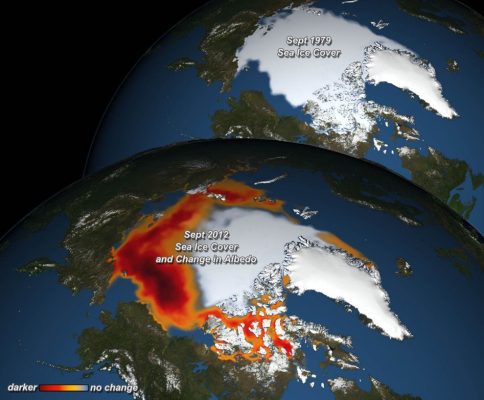
One of the most dramatic signals of Earth’s recent warming has been the precipitous decline of the Arctic sea ice. While the sea-ice decline is in response to warming ocean and atmosphere, it also has an important feed-back on the climate itself.
Solar radiation and albedo
Earth’s main energy source is solar radiation. This solar radiation is either absorbed in the atmosphere or at the surface of the planet, or it is reflected back into space. The measure of how reflective a surface is is called its albedo. Sea ice, being white, has an extremely high albedo, compared to the ocean. Therefore when the sea ice declines, more solar radiation is absorbed by the planet, leading to more warming.
Shrinking sea ice decreases the albedo of the Arctic
Our image of the week shows a figure based on data presented in Pistone et al (2014), produced by the NASA/GSFC Scientific Visualization Studio. It shows how the declining Arctic sea ice has decreased the average albedo in the Arctic, with darker colors indicating a declining albedo and therefore warming of the Arctic Ocean. Based on satellite estimates of the sea-ice extent since 1979, the authors were able to constrain that the impact of the sea-ice retreat alone has led to an amount of global warming that is more than 1/4 as strong as the effect due to increased C02 in the atmosphere.
An animation of the annual Arctic sea ice minimum with a graph overlay showing the area of the minimum sea ice in millions of square kilometres.(Credit: NASA/GSFC Scientific Visualization Studio)
Reference/further reading
- Pistone, K., Eisenman, I., & Ramanathan, V. (2014). Observational determination of albedo decrease caused by vanishing Arctic sea ice. Proceedings of the National Academy of Sciences, 111(9), 3322-3326.
- “Arctic Sea Ice Minimum | NASA Global Climate Change.” Climate Change: Vital Signs of the Planet. Web. 09 June 2016.
- Previous Image of the Week : How seasonal sea-ice decline differs
- Previous Image of the Week : Future Decline of sea-ice extent in the Arctic
Edited by Sophie Berger and Emma Smith

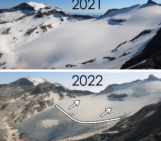
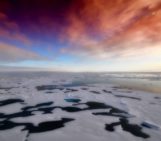
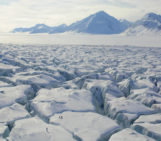
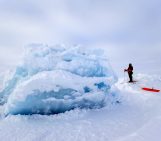
Pingback: Cryospheric Sciences | Image of the Week – The ups and downs of sea ice!
Pingback: Cryospheric Sciences | Image of the Week – Climate feedbacks demystified in polar regions
Pingback: Cryospheric Sciences | Image of the Week – Stuck in the ice: could have it been predicted?
Pingback: Cryospheric Sciences | Image of the Week – Sea Ice Floes!
Pingback: Cryospheric Sciences | Climate Change & Cryosphere – The tropical fingerprint in Arctic climate
Pingback: Cryospheric Sciences | Hysteresis For Dummies – Why history matters
Pingback: Cryospheric Sciences | Ice-hot news: A cryo-summary of the new IPCC assessment report!